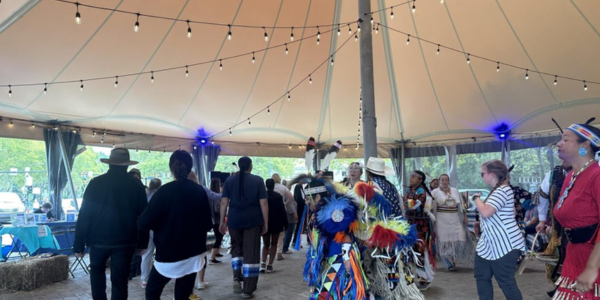
On a rainy Wednesday afternoon in Schenley Plaza, the loud echoes of drums and intertribal song echoed around Oakland from the “mini powwow” taking place as a part of the third annual Indigenous Cultural Festival.
Pitt’s Indigenous Cultural Festival is a weeklong event offering a variety of activities in which Pitt students and the local community are invited to engage with traditional Indigenous cultures. In addition to the mini powwow, the festival includes a leather pouch making workshop, a Native American music workshop and dreamcatcher making demonstrations.
The week commenced with the Dorseyville Powwow on Saturday, Sept. 28 and Sunday, Sept. 29. Powwows are ceremonial social gatherings within Indigenous communities where people share in traditions of intertribal song, drum music and grass dance with other community members.
The mini powwow, hosted by the University of Pittsburgh in coordination with the Council of Three Rivers American Indian Center, was a showcase of a traditional Indigenous social gathering, including dancing, historical education, vendors and food that Pitt students and the wider community were invited to enjoy.
Michael Simms, the cultural coordinator for COTRAIC and lifelong member of the Seminole tribe, describes COTRAIC as an organization that “gives urban Indians a place to call home.” In recent years, the organization has expanded its mission of facilitating the exchange of Indigenous culture in the Pittsburgh area.
“I find it very important for me to go out and do these things like what we have here at Pitt,” Simms said. “We are here to share our culture … as well as answer questions people have they might not realize. A lot of people ask questions like ‘Where do you live?’ Most people don’t realize we live here in normal houses like everybody else.”
Events like the Indigenous Cultural Festival play a large part in how Simms and other Indigenous people are able to go out and share their cultures and answer questions regarding their lifestyles.
“The significance of this powwow is that it is the bridge of a working relationship between the Council of Three Rivers and the University of Pittsburgh,” Simms said. “Now we have a chance to bring our culture right here to Oakland and share our culture, our songs, and show people we still exist.”
Krisa Spangler of Monroeville is a member of the Mohawk tribe who works for COTRAIC’s finance and human resources departments and helped coordinate the mini powwow with Pitt staff.
“Ever since I was young [my family and I] went to powwows and other educational events,” Spangler said. “This is how youth learn, this is how I learned … you go and you do things and it becomes your common knowledge.”
Spangler and Simms both recognized powwows as social gatherings that bring together Indigenous and non-Indigenous people. Throughout the event, COTRAIC-affiliated dancers demonstrated various dances and invited students and others in attendance to come and try them out for themselves.
One such student who joined in on the dances was Alex Stein, a fourth-year English writing major with music minor who has been working with COTRAIC to complete an ethnomusicology project. Stein feels that it is crucial for students to “learn more about American Indian culture.”
“It’s really important to explore other cultures, and in the case of this event join in where allowed to experience the joy of these powwows and the joy of these dances and music,” Stein said.
Spangler feels that it’s both important and necessary to impart Indigenous cultural knowledge on the local community as an Indigenous person.
“It’s always nice to learn new things about different cultures of experiences. Just like there are Greek Festivals or Italian Festivals, the Indigenous Festival or the mini powwow puts that into perspective for Native American people,” Spangler said “This may be something that students or people locally may not see in any other ways.”
Erin Ortega, a graduate student at the Pitt School of Public Health and Public International Affairs, attended the mini powwow because of her connection to Indigenous history.
“I’m originally from California, and my mom would take my sister and I to powwows growing up,” Ortega said. “This Indigenous Cultural Festival that Pitt puts on every year is something that I enjoy watching and participating in.”
As a Pitt student, Ortega believes it’s important to have access to opportunities for cultural exchange.
“Having and hosting Indigenous people from the area is a good reminder to students and also Pittsburgh in general that Indigenous people still exist, and that despite colonialism, they are still passing on traditions,” Ortega said. “Attending events such as the mini powwow is a great way to participate and bear witness to these traditions persevering.”’
Seeing students interact with members of COTRAIC through the mini powwow and other events held as a part of the Indigenous Cultural Festival is something that Simms and Spangler believe to be essential to the continuous exchange of their culture.
Simms hopes through “this cultural week” and events such as the mini powwow, “People will understand Indigenous culture is still very much alive.”
Mollie Young

